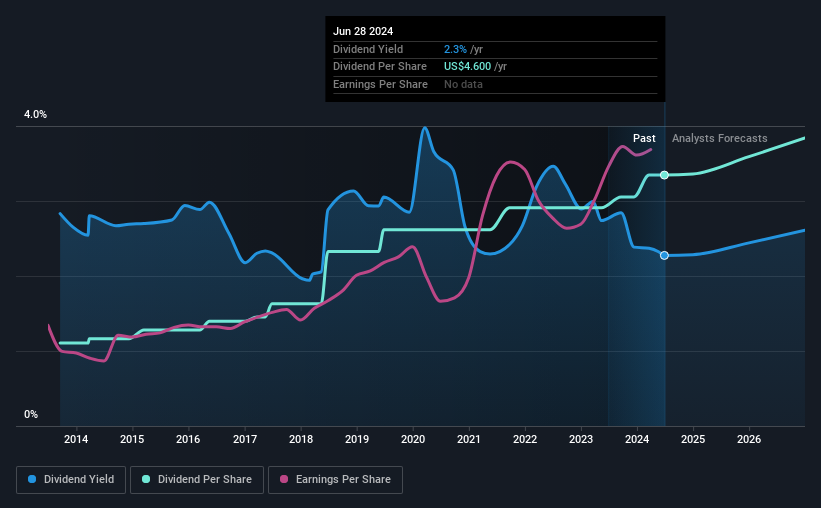JPMorgan Chase (NYSE:JPM) Is Due To Pay A Dividend Of $1.15
JPMorgan Chase & Co.'s (NYSE:JPM) investors are due to receive a payment of $1.15 per share on 31st of July. Despite this raise, the dividend yield of 2.3% is only a modest boost to shareholder returns.
See our latest analysis for JPMorgan Chase
JPMorgan Chase's Earnings Will Easily Cover The Distributions
It would be nice for the yield to be higher, but we should also check if higher levels of dividend payment would be sustainable.
Having distributed dividends for at least 10 years, JPMorgan Chase has a long history of paying out a part of its earnings to shareholders. Past distributions do not necessarily guarantee future ones, but JPMorgan Chase's payout ratio of 26% is a good sign as this means that earnings decently cover dividends.
Looking forward, EPS is forecast to rise by 5.0% over the next 3 years. The future payout ratio could be 30% over that time period, according to analyst estimates, which is a good look for the future of the dividend.
JPMorgan Chase Has A Solid Track Record
The company has an extended history of paying stable dividends. The dividend has gone from an annual total of $1.52 in 2014 to the most recent total annual payment of $4.60. This works out to be a compound annual growth rate (CAGR) of approximately 12% a year over that time. We can see that payments have shown some very nice upward momentum without faltering, which provides some reassurance that future payments will also be reliable.
The Dividend Looks Likely To Grow
Some investors will be chomping at the bit to buy some of the company's stock based on its dividend history. It's encouraging to see that JPMorgan Chase has been growing its earnings per share at 13% a year over the past five years. Growth in EPS bodes well for the dividend, as does the low payout ratio that the company is currently reporting.
JPMorgan Chase Looks Like A Great Dividend Stock
In summary, it is always positive to see the dividend being increased, and we are particularly pleased with its overall sustainability. Distributions are quite easily covered by earnings, which are also being converted to cash flows. All of these factors considered, we think this has solid potential as a dividend stock.
Companies possessing a stable dividend policy will likely enjoy greater investor interest than those suffering from a more inconsistent approach. Meanwhile, despite the importance of dividend payments, they are not the only factors our readers should know when assessing a company. For example, we've identified 2 warning signs for JPMorgan Chase (1 is a bit unpleasant!) that you should be aware of before investing. Looking for more high-yielding dividend ideas? Try our collection of strong dividend payers.
Have feedback on this article? Concerned about the content? Get in touch with us directly. Alternatively, email editorial-team (at) simplywallst.com.
This article by Simply Wall St is general in nature. We provide commentary based on historical data and analyst forecasts only using an unbiased methodology and our articles are not intended to be financial advice. It does not constitute a recommendation to buy or sell any stock, and does not take account of your objectives, or your financial situation. We aim to bring you long-term focused analysis driven by fundamental data. Note that our analysis may not factor in the latest price-sensitive company announcements or qualitative material. Simply Wall St has no position in any stocks mentioned.
Have feedback on this article? Concerned about the content? Get in touch with us directly. Alternatively, email editorial-team@simplywallst.com

 Yahoo Finance
Yahoo Finance 
